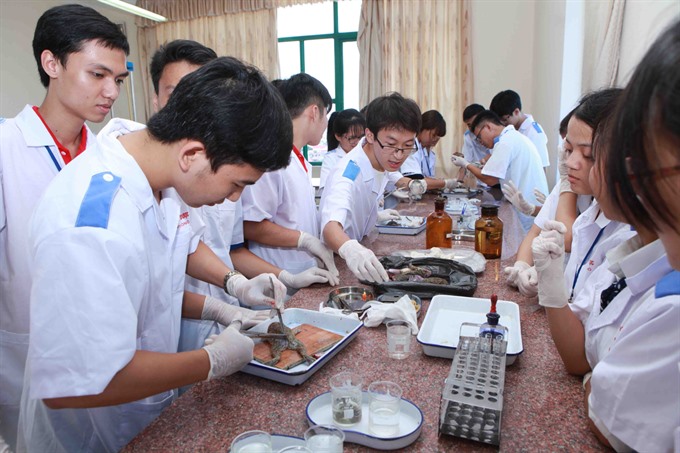 Society
Society

A proposal by the Ministry of Health (MOH) for a new medical curriculum raised different opinions from experts.
 |
| A practice session on animal parts of medical students at the Hải Phòng Medical University in the northern Hải Phòng City. — VNA/VNS Photo Quý Trung |
HÀ NỘI — The Ministry of Health’s (MOH) new medical curriculum proposal raised different opinions from experts.
Aiming to improve the quality of personnel in the medical sector, in September, MOH proposed to shorten the education duration for a medical Bachelor’s degree from 6 to 4 years.
After completing the four-year degree, students who wish to do medical research or to lecture in the medical field will proceed to pursue a Master’s or Ph.D degree.
Students who wish to pursue medical practice will embark on another 2 years of formal education to get a ‘medical doctor’ certificate.
Medical doctors who wish to become ‘general practitioners’ will then take a one-year internship at hospitals, then pass a national medical exam to be certified as general practitioners and qualified for medical practice.
Medical doctors who wish to become ‘specialist doctors’ will spend 2-3 years practising their medical specialties at hospitals, then take an exam to be certified as specialist doctors.
Nguyễn Minh Lợi, deputy director of the Administration of Science, Technology and Training under MOH, said that such “ramification” would highlight the difference between theoretical education and practical training.
Medical researchers would be educated differently from medical practitioners, which would improve the doctors’ capabilities in providing medical treatment in reality, he said.
Associate Professor, doctor Nguyễn Đức Hinh, principal of the Hà Nội Medical University, said that the shortened curriculum provided initial training, which only ensured that medical graduates would receive the same salary as graduates from other four-year majors.
However, 11-12 years of training were required of those who wish to become specialist doctors, six years for general education and the other six for specialist training, he said.
Dr Trần Bình Giang, deputy director of the Việt Nam-German Hospital said that the six-year general curriculum was heavily theoretical at the moment.
There were no “unified, exact” measures in the medical field to evaluate the quality of medical graduands, which maked it difficult “to tell whether they will become good doctors,” he added.
He said that even though medical graduands practised at hospitals, the lack of evaluation criteria made it difficult for them to see whether they were making progress with their practices.
The two-year residency training programmes provided by medical universities choose to train the best medical students only to keep them doing theoretical research at universities and academies, leading to a severe shortage of medical practitioners in the country, he said.
Dr Phạm Mạnh Hùng, chairman of the Việt Nam Medical Association, said that since medicine was an ever-evolving profession, the current standards were inadequate to provide doctors with a one-time certificate like how it is being done in Việt Nam.
“Doctors around the world have to take exams every 5 years to renew their licences to practise medicine,” he said.
“They must keep their medical knowledge updated and continuously hone their skills in order to ensure safe medical practice and reduce the number of medical complications,” he said. — VNS




